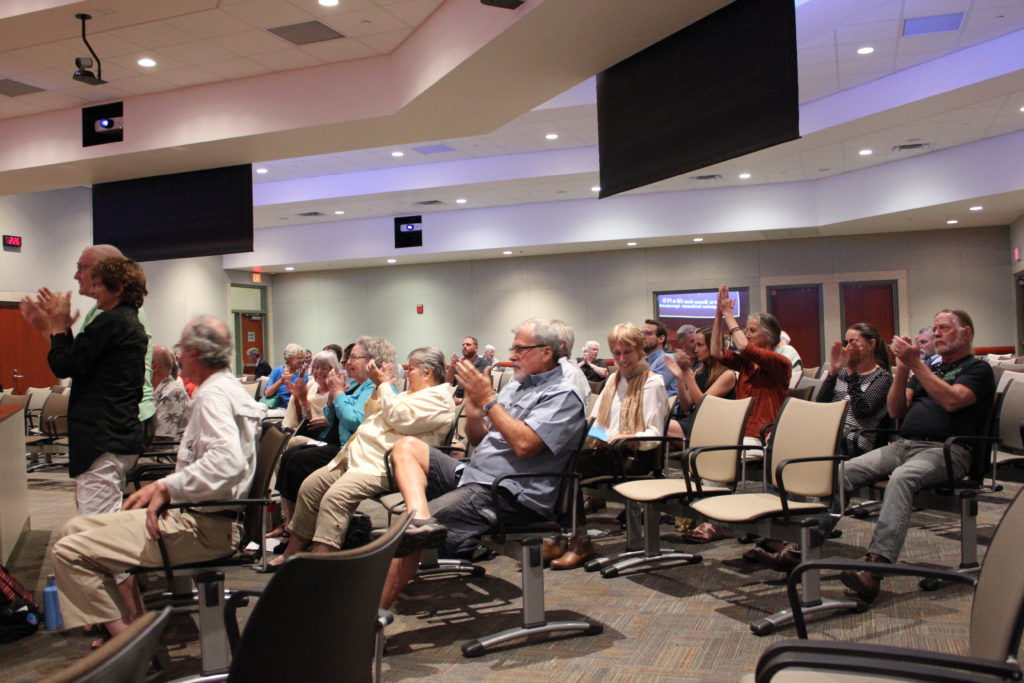St. Augustine, FL — A major developer was turned down again in Florida’s fastest growing county, despite spending more than three years working closely with the county on an acceptable development plan and adding $37 million in projects the county wants, like a fire station, a wastewater treatment plant and new parks.
KG Development’s proposal was declined 4 – 1 by the St. Johns County Commission on Tuesday after a three-hour meeting.

The crowd erupted in cheers, applause and a standing ovation, while the project’s lead engineer was seen shaking his head in apparent disbelief.
“I didn’t think it was headed that way,” said a beaming Jane West, attorney for a citizens’ group opposing the project, to a crowd of supporters afterward. “Now we just have to win in court.”
She’s referring to a lawsuit brought by the developer against St. Johns County for turning down its first proposal back in 2015. The suit charges the county with not following its own growth plan and thereby harming the developer’s property value.
Local governments in Florida are required to have a Comprehensive Plan governing growth. Doug Miller, a professional engineer with the Jacksonville-based civil engineering firm England-Thims and Miller, had argued the placement of King’s Grant subdivision at the intersection of I-95 and Hwy 206 was exactly what the county comp plan called for. He said the plan aims to promote growth away from the coast and near transportation routes and the interstate interchanges. That’s been in the plan more than 25 years, he said, noting that it was approved by former commissioners. While the property is currently zoned “Open Rural,” the county land use plan specifies the 3,200 acre area where the property is located as a “mixed use district.”
“That’s what this [development] is,” he said to commissioners.
But West said a land owner does not have the right to use the property for the most intensive use.
“That decision rests with the county,” she said.
And the county has now said “no” twice, despite approving high density developments in the north end of the county, like Nocatee, an eventual 10,000 home subdivision.
In 2015, the commission voted “no” to King’s Grant in a 3 – 2 vote. The three commissioners who voted against the project were concerned about the environment, infrastructure and sprawl. (See our prior coverage here.)
Specifically, some felt the subdivision was out-of-place with the rural surroundings in the southern end of the county, which might define it as “sprawl.” Sprawl is prohibited by Florida growth management laws, although the exact definition is subject to debate. They were also concerned that the county would have to foot a big bill for all the new infrastructure to support the development. Commissioners and citizens were worried that runoff could impair area waterways, like Pellicer Creek. The creek drains into the Matanzas River, where the last three oyster leases in northeast Florida are found.
The runoff issue seemed to be answered by this go-around. The developer is proposing building an Advanced Waste Water Treatment Plant that provides the highest level of treatment available for sewer and storm water. It would not only treat waste from the development but would pipe in an additional 300,000 gallons per day from an area to the northeast. Currently that waste is piped under the Matanzas River to a treatment plant on Anastasia Island. Treated sewage is then released into the river.
Commissioner Jay Morris asked city utility manager Bill Young what the value of that is to the city.
“Significant,” said Young. He said it would cost the county between $25 and $30 million to build a plant on their own.
“That’s a benefit for the Matanzas River,” said Gary Hunter, a Tallahassee attorney representing the developer.
Commissioner Morris had no further environmental concerns, saying that component had been handled “correctly and responsibly” by the developer.
The developer also offered to build, equip and staff a fire station for three years, a $10 million value, although $5 million would be paid back as the project builds out.
Commission head Harry Dean called the developer’s new proposals “enticing” because he said the county can’t afford to fund new infrastructure and removing effluent from the Matanzas River is good. But ultimately he voted not to accept the proposal.
“I can’t ignore the fact that this project is incompatible with the surrounding part of the county,” he said. “It’s a good project, well designed, has good environmental benefits and brings a lot to the table. But it would change the fabric of the southern portion of the county.”
Retiring commissioner Jay Morris was the wild card this time. In 2015, he voted against King’s Grant because there was no nearby fire station and the county staff felt economic projections were overstated. That was alleviated this time by the developer’s $10 million offer of a fire station. On Tuesday, he cast the sole vote in favor of the project.
“I truly believe we’ve been our own worst enemy,” he said. Morris had wanted to see a half-cent sales tax put on the ballot and passed by voters in 2015, but that didn’t happen. If it had, the county would today have $57 million “to do what we need to do and not have to depend on developers,” he said.
“Have we built any new libraries? No,” he said. “Any new fire stations? No. Any new parks? No, because we have no funding source.”
He said it will get worse when the Homestead Act passes next month, raising the homestead exemption by $25,000 per household. He said that will take $10.5 million out of the county’s general fund. (Amendment 1, also referred to as the Homestead Act, will be on the mid-term ballot November 6. It’s an amendment to the Florida constitution that would raise the homestead exemption from $50,000 to $75,000 and thereby reduce some residential property taxes. Since local governments are funded primarily by property taxes, the reduction to local revenue is projected to be $753 million, according to the Florida Association of Counties. Morris expects it to be approved by Florida voters.)
“This board will have a tougher deal a year from now when that kicks in,” he said.
Citizens also were opposed to the development; only one spoke in favor of it. Many residents who live in the area spoke against it, citing the quiet, rural surroundings. They were unimpressed with the developer’s offer to build city sports fields and a park.
“No one who lives in that part of the county is going to go to a park in a subdivision,” said Pat Hamilton.
Others were concerned that the project would create a precedent and the whole area would be turned into “cookie cutter” subdivisions. They noted the developer also owns other parcels, although plans for those haven’t been discussed in the commission meeting. In public comment, several citizens wondered what the developer’s overall plan for the area is.
It turns out, the property owner’s website clearly indicates the true scope of the project.
KG Development is owned by BHK Capital, a developer headquartered in Ponte Vedra in Duval County. Its website states it is “currently developing 3,000 acres into a residential community of 999 homes … .” King’s Grant is only 772 acres.
Hunter, the Tallahassee attorney, complimented the civility of the crowd, while stating he sees the same objections all over Florida. “Very few projects are popular,” he said. But he also noted that with 1,100 people per day moving to Florida, unless the state wants to “build a wall,” the growth has to go somewhere and it should be where the comp plan designates.
“They [citizens] don’t like the previous decisions you’ve made,” he argued. “But they’ve been made.”
With this 4 -1 vote, the county will continue defending itself from the developer’s lawsuit and will not change the current zoning to allow development to proceed.


Leave a Reply